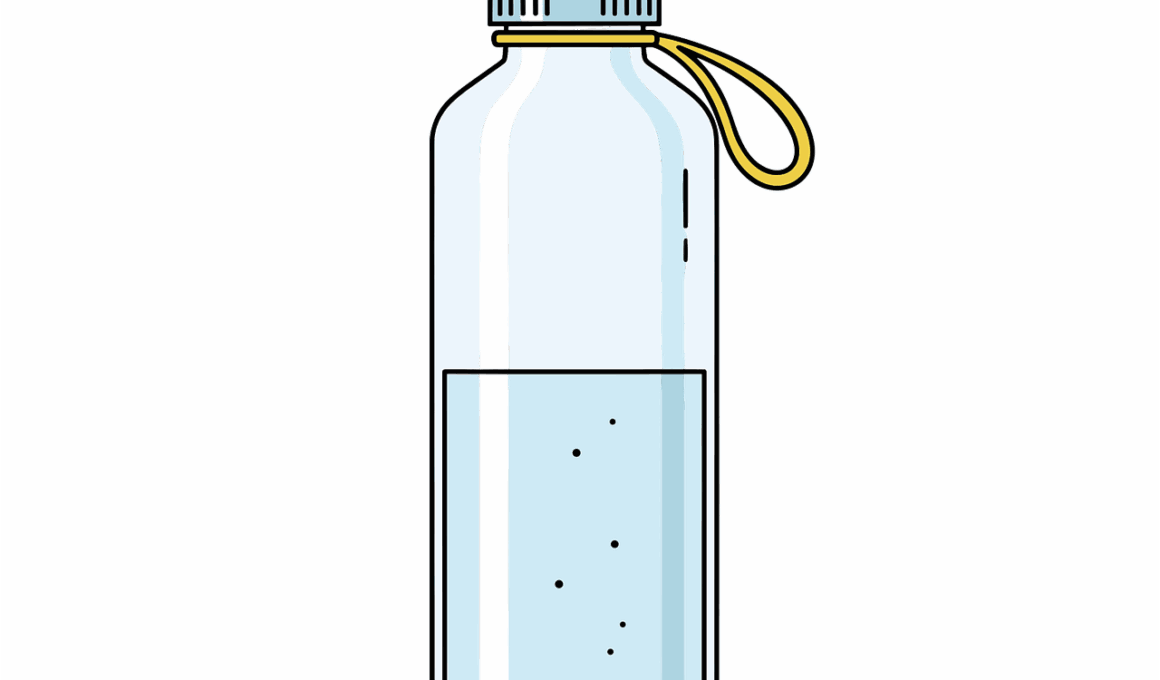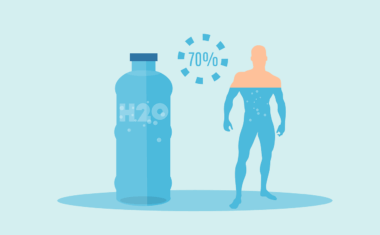Hydration as a Preventative Measure for Chronic Respiratory Diseases
Maintaining proper hydration levels is crucial for overall health, but it influences respiratory function significantly. When the body is well-hydrated, the mucous membranes lining the respiratory tract remain moist and healthy. Dehydration can lead to thickening of mucus, making it harder for the body to clear pathogens and pollutants. Chronic respiratory diseases, including asthma and chronic obstructive pulmonary disease (COPD), can worsen due to insufficient hydration. Those who struggle with these conditions often notice increased symptoms when they are not adequately hydrated. Furthermore, dehydration can lengthen recovery times after respiratory infections, placing additional strain on the overall immune response. When assessing the risk for chronic respiratory diseases, considering hydration should be integral to a comprehensive plan. Consuming adequate fluids daily helps maintain optimal lung function, aiding with airflow and reducing resistance during breathing. This is particularly vital for individuals living in dry or polluted environments, where moisture evaporation from mucous membranes happens more rapidly. Thus, staying hydrated should be a simple and effective strategy in the prevention and management of chronic respiratory conditions. Adopting healthy drinking habits is essential in promoting long-term respiratory wellness.
Hydration not only impacts airway and mucus health, but also affects lung function in a broader sense. Studies show that adequate fluid intake contributes to optimal exercise performance, which is intrinsically linked to respiratory health. For example, during physical activity, the body loses water through sweat and respiration. Consequently, maintaining hydration levels becomes vital to ensure that the respiratory system can function efficiently. Dehydration may lead to decreased lung volume and reduced gas exchange, increasing fatigue and shortness of breath during exercise. Individuals with chronic respiratory diseases often experience difficulties in performing exercises due to these factors. Therefore, it becomes crucial for them to monitor their hydration status, especially during physical activities. Adequate fluid intake not only enhances exercise capacity but also helps prevent exacerbation of respiratory symptoms. Achieving and retaining hydration can be facilitated by consuming not just water but also hydrating foods. Fruits and vegetables like cucumbers, oranges, and spinach have high water content and can contribute significantly to daily fluid intake. Recognizing the importance of hydration in preventing chronic respiratory conditions is vital for overall health and quality of life.
The Role of Electrolytes in Hydration
In addition to plain water, understanding the role of electrolytes in hydration can further enhance respiratory health. Electrolytes, which include sodium, potassium, and magnesium, play a crucial role in maintaining fluid balance in the body. When individuals sweat excessively, they lose not only water but also essential electrolytes. This can lead to dehydration and, consequently, negatively affect respiratory function. The lungs require a fine balance of hydration for optimal performance, and electrolytes help facilitate this balance. Including electrolyte-rich beverages or foods can assist in maintaining hydration levels during intense activities or in hot climates. Coconut water, sports drinks, and broths can replenish these vital minerals while promoting hydration. Additionally, maintaining proper electrolyte levels is pivotal in nerve and muscle function, including those muscles involved in respiration. A well-hydrated body with balanced electrolytes helps in efficiently transporting oxygen to cells, aiding recovery for individuals with chronic respiratory conditions. Thus, awareness of hydration and electrolyte balance must be emphasized in preventative strategies for respiratory health to foster improved quality of life.
For optimal respiratory health, the timing of fluid intake is also significant. It’s not just about how much one drinks throughout the day; distinct patterns can generate different effects on the body and respiratory function. Taking smaller sips of water consistently is often more effective than consuming large quantities all at once. This is because gradual intake helps keep the mucous membranes moist without overwhelming the system. Drinking water or hydrating fluids before meals can also support digestion and overall hydration. Conversely, it’s advisable to limit diuretics, such as caffeine and alcohol, as they can lead to increased fluid loss and potential dehydration. Additionally, incorporating hydration into daily routines is essential, such as having a glass of water with every meal or keeping a water bottle handy throughout the day. Monitoring urine color can be a useful indicator of hydration status; a light yellow color typically suggests adequate hydration levels. By understanding not only the quantity but also the timing of fluid intake, individuals can greatly enhance their respiratory health and reduce the risk of chronic diseases.
Hydration and Respiratory Infection Recovery
Hydration plays an incredibly significant role in recovery from respiratory infections. Individuals suffering from coughs, colds, or more severe conditions like pneumonia often experience high fluid loss due to fever and increased respiration rates. Adequate hydration aids in thinning mucus and promoting easier airway clearance. This is vital during the recovery process as the body works to eliminate pathogens and heal inflamed tissues. Research indicates that individuals who maintain good hydration levels during illness tend to experience reduced symptom severity and shorter recovery times. Water, herbal teas, and broths can provide supportive nutrients and fluids essential for healing. Additionally, staying hydrated supports overall immune responses, allowing the body to effectively combat respiratory infections. Furthermore, humidity levels can be improved with proper hydration, helping alleviate discomfort associated with dry air that can irritate the respiratory system. Therefore, hydration should be prioritized during respiratory illness recovery. To promote healthier breathing and facilitate quicker recoveries, individuals are encouraged to prioritize fluid intake actively. Establishing a fluid-recovery plan can lead to better outcomes and enhance overall health.
Advocating for hydration in public health campaigns can have a significant impact on respiratory health at large. Many individuals may overlook their hydration needs, which can lead to complications and increase susceptibility to chronic respiratory diseases. By prioritizing education on the importance of hydration, communities can foster better health awareness. Initiatives can include workshops, seminars, and distributing educational materials highlighting hydration’s role in respiratory health. Schools, workplaces, and healthcare facilities can serve as platforms to promote these messages actively. Furthermore, developing community water stations can ensure people have easy access to drinking water, encouraging more individuals to stay hydrated continuously. Additionally, public health messages can address the dangers of dehydration during temperature extremes, particularly for vulnerable populations, such as the elderly or those with pre-existing respiratory conditions. Personalized hydration plans tailored to individual needs can also be encouraged, emphasizing regular fluid intake throughout the day. Collectively, these initiatives can lead to improved overall population health, especially in combating chronic respiratory diseases while lowering healthcare costs through prevention efforts. Emphasizing proper hydration is a straightforward yet effective preventative measure for respiratory health.
Conclusion: The Importance of Continuous Hydration
In conclusion, adequate hydration is not just beneficial; it is essential for optimal respiratory health and should not be underestimated. Understanding the link between fluid intake and respiratory function resounds particularly for those with chronic conditions or at risk for respiratory diseases. By adhering to good hydration practices, individuals can potentially reduce the severity and occurrences of respiratory related issues. Moreover, hydration contributes to enhanced physical performance, quicker recovery from illness, and improved immunity against infections. Incorporating adequate fluids, utilizing electrolytes, and maintaining appropriate hydration timing can lead to improved respiratory health outcomes. Public health advocacy can ensure better awareness, encouraging communities to adopt hydration as a key element in promoting wellness. As individuals take steps to prioritize their hydration in daily life, they lay the groundwork for healthier breathing patterns and fewer complications. Thus, developing a daily habit of healthy fluid intake, recognizing the signs of dehydration, and understanding the importance of fluid balance is vital. Hydration acts as a powerful preventative measure in the ongoing fight against chronic respiratory diseases, contributing to long-term health and improved quality of life overall.
Lastly, personal anecdotes and testimonials can also effectively emphasize hydration’s role in respiratory health. Many individuals report significant improvements in their respiratory symptoms after increasing their fluid intake. From enhancing mucus clearance to reducing the frequency of asthma attacks, personal success stories can inspire others to prioritize hydration. Health practitioners can share these experiences with patients, highlighting real-life impacts and motivating adherence to recommended hydration practices. This approach humanizes the healthcare message and fosters community engagement by encouraging individuals to share their own hydration journeys. Various online platforms and community forums can serve as outlets for sharing these stories, creating a supportive environment that promotes collective health. Ultimately, focusing on hydration brings forth a unified approach to combating chronic respiratory diseases. Everyone can benefit from being more aware of their hydration needs, leading to healthier lives and a stronger community overall. By engaging in informative discussions and learning from both healthcare professionals and peers, individuals can embrace a culture of wellness that emphasizes the importance of staying hydrated. In such a climate, water emerges not only as a basic necessity but as a tool for empowerment in respiratory health.





